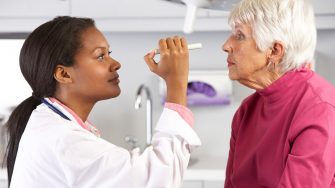
The Low Vision Clinic provides a service for people who have permanent visual impairment. These people have reduced vision that cannot be corrected to normal levels by standard spectacles or contact lenses. Our low vision comprehensive rehabilitation assessments are available to UNSW staff, students and the public at no cost to patients during clinical teaching sessions.
A comprehensive low vision assessment includes the following:
- Taking a careful ocular and medical history.
- A discussion of symptoms and assessment your visual requirements.
- Assessment of functional vision, including high contrast Visual Acuity, contrast sensitivity, Binocular Vision (the way your eyes work together), and peripheral vision.
- Evaluation of ocular health and age-related changes in vision.
- The assessment, trial, prescription and training of the appropriate low vision device, magnifier, filter, electronic magnifier, lighting or non-optical aid.
- Referral and Advice on activities of daily living and independent mobility.
- Vision assessment for driving and bioptic telescopes
- NDIS/workplace assistive technology funding recommendations
Frequently asked questions
-
Consultations during clinical teaching sessions are free. Final year students are supervised by optometrists that have advanced clinical skills in low vision care. You do NOT need a Medicare Card. If you prefer to be examined without students present, then Medicare plus a gap payment is required.
If you require a spectacle prescription and do not want to purchase from us, then a $15 administration fee applies.
Full reports are available on request and a $250 fee will apply.
-
You do not require a formal referral to attend our clinic. However, if you have been given a written referral to the UNSW Optometry Clinic by your local optometrist, ophthalmologist, medical practitioner or other health care professional, please forward a copy of the referral to reception at least 48 hrs before your scheduled appointment either by fax (02) 9055 1900 or email optomclinic@unsw.edu.au
-
Depending on the type of difficulty you are experiencing with your eyes, your comprehensive eye examination may take a longer time. A general guideline is to allow up to 2 hours, which includes the initial testing as well as discussions about treatment options and recommendations. Follow-up appointments are usually shorter.
-
- Your current spectacles (and/or spectacle prescriptions) and magnifiers.
- A list of any regular medications and any known allergies.
- Any reports or visual field tests from other healthcare professionals that you might have.
-
No, a low vision comprehensive assessment does not include a dilated examination of your eyes. If required, you may be referred to another clinic for further assessment of your ocular health.
-
Our UNSW Optometry Clinic offers a wide selection of fashionable frames as part of our complete service. Our specialist can advise you on all the factors to consider, including the type of lenses and frames that are most suited to your vision, comfort, and the intended use for the spectacles.
We also offer sunglasses, occupational eye protection as well as contact lenses and solutions.
Our prices are well below retail prices, and then discounted by up to 20% if you attend our student clinics. We also have competitively priced package deals.
The UNSW Optometry Clinic is an agent for the free spectacle schemes run by the Department of Community Services and the Department of Veterans Affairs. The UNSW Optometry Clinic is also a NDIS service provider. The UNSW Optometry Clinic offers free spectacles/magnifiers to patients who qualify.
-
Consultations during clinical teaching sessions are free. Final year students are supervised by optometrists that have advanced clinical skills in low vision care. You do NOT need a Medicare Card. If you prefer to be examined without students present, then Medicare plus a gap payment is required.
If you require a spectacle prescription and do not want to purchase from us, then a $15 administration fee applies. Reports are available on request and a $30 fee will apply.
Low vision clinics run on Tuesday (mornings and afternoons)Our clinic has been designed to match the needs of people with low vision. Your visit will not be rushed, and you will have ample time to talk about your needs and concerns to a professional who understands your problems.
Looking to give back?
You can volunteer in our studies at UNSW School of Optometry & Vision Science.
